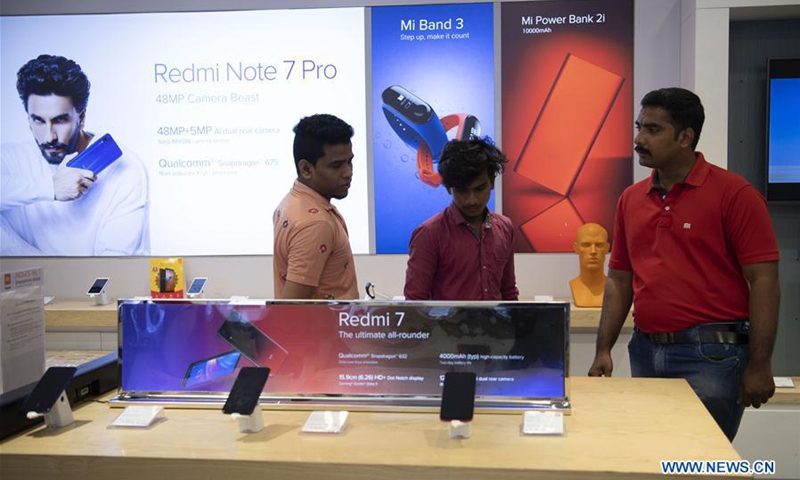
Customers are seen at a store of Chinese technology company Xiaomi in Chennai, India, Oct. 8, 2019. (Xinhua/Lui Siu Wai)
Chinese smartphone vendor Xiaomi said Wednesday it remains confident in the key Indian market, although recent calls to "boycott China" due to bilateral tensions have clouded the prospects of Chinese firms there.
Xiaomi had a 30.7-percent share in the smartphone market in the second quarter in India, according to the company's earnings report released on Wednesday.
Xiaomi retained the top ranking in the Indian smartphone market for the 12th consecutive quarter during those three months, data from IDC showed.
As India gradually lifted the lockdown that started in late March, demand rebounded, Xiaomi said. In July, the average daily number of smartphone activations in India returned to 72 percent of the pre-pandemic level in January.
In June, India banned 59 Chinese apps for threatening the country's "sovereignty and integrity", including TikTok, UC Browser and Xiaomi's Mi Community app.
Tang Dajie, director of research for SIE Enterprise Research Institute, said that Xiaomi is so dominant in India that it has become a punching bag for populism.
"Xiaomi faces the same problems as other Chinese products in the Indian market and other overseas markets, with complex, volatile international markets and unpredictable incidents," Tang told the Global Times on Wednesday.
Meng Qingbin, professor at the Business School at Renmin University of China, told the Global Times that without India's clampdown, Xiaomi would have done better.
Despite uncertainties in overseas markets and the impact of the COVID-19 pandemic, Xiaomi realized steady growth in key markets in the second quarter. Smartphone shipments grew 64.9 percent year-on-year in Europe, achieving a total market share of 16.8 percent, ranking it in the top three for the first time.
It remained first in Western Europe among major players with smartphone shipment growth of 116 percent year-on-year. Shipments in Spain grew 150.6 percent, ranking first for two consecutive quarters with a 36.8 percent market share.
In Eastern Europe, Xiaomi became No.1 in Ukraine and Poland in terms of shipments.
Zoltan, a Hungarian who lives in Beijing, told the Global Times that he sends Xiaomi phones as gifts to friends and relatives every year when he goes back to Hungary.
"Xiaomi's smartphone sales in Europe have risen so fast and it's not easy to be the sales champion in some European countries. This shows that Xiaomi has gradually moved away from its original cheap positioning and started to focus on some high-end and smart brands," Meng said.
Xiaomi said revenue went up 3.1 percent to 53.54 billion yuan ($7.77 billion) and gross profit rose 6.1 percent to 7.7 billion yuan.
Lin Meibing, chief analyst of Wit Display, told the Global Times on Wednesday that the results showed that smartphones remain at the core of its business, and Xiaomi is gradually shifting its core business to overseas markets.
"Xiaomi's share in the domestic market is getting smaller and smaller. Besides the impact of the epidemic, another important reason is Huawei. The latter's overseas market has been hit by the US crackdown, so it has been focusing on the domestic market in the past two years. As a result, sales of Huawei mobile phones have been rising, which has put a lot of pressure on Xiaomi's domestic market, online and offline," said Lin.



